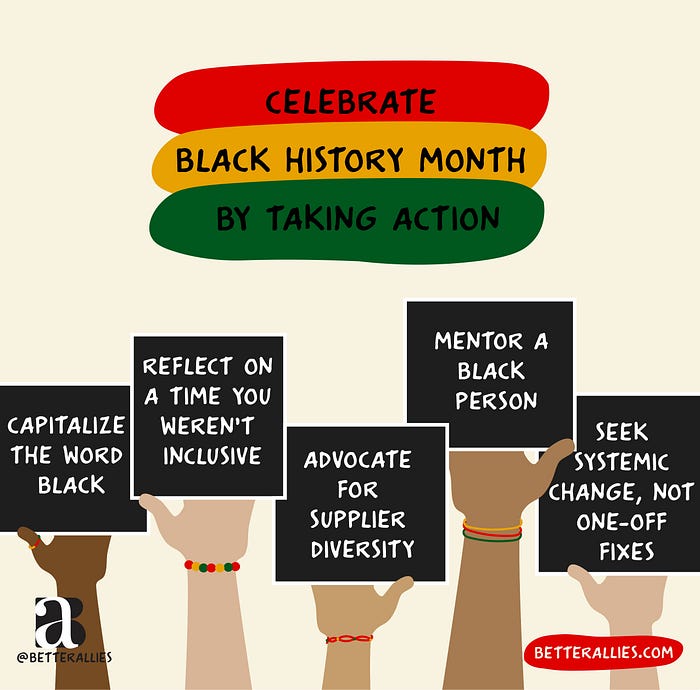Celebrate Black History Month By Taking Action (Here Are Five Ideas)
Each week, Karen Catlin shares five simple actions to create a more inclusive workplace and be a better ally.

1. Celebrate Black History Month by taking action
As Nicole Cardoza wrote in the Anti-Racism Daily,
“This is a year for making the history books, not only for re-reading them. Education is essential, but we have to also take targeted actions to change the course of history.”
While changing the course of history may seem like big shoes to fill, let’s remember that change starts with a single act. Here’s just one idea: Mentor a Black person in your organization.
Last June, CNBC reported that six years after releasing their first diversity reports, Alphabet, Apple, Facebook, Microsoft, and Twitter have shown only low single-digit increases in their percentage of Black employees. While many factors contribute to these numbers, one of them could be that Black workers feel left out of “the know.” They may never have been mentored on how to thrive or counseled on staying connected to key networking activities. They may not be in the loop on important discussions or have influential friends who can recommend their work.
One thing an ally can do to change this cultural tendency is mentor a Black person at their company. Is this you, but you’re not sure where to start? If you have a resource group for Black employees, reach out to its leadership and ask for advice about your next steps.
Read on for more ideas for taking action during Black History Month.
2. Seek systemic change, not one-off fixes
Imagine you are part of a hiring committee, and you realize the group is measuring candidates inconsistently. Group members are using subjective criteria that treat the one Black candidate less favorably than the rest of the pool. Let’s call that candidate Dom.
The group’s biased objections to Dom might sound like, “I just didn’t click with them. I can’t quite put my finger on it.” Or, “I don’t think I’d feel comfortable putting them in front of customers.” Or perhaps someone might say, “Dom doesn’t have the four to six years of coding experience listed in the job description,” even though other candidates who also lacked that experience received a thumbs-up.
You might push back to give Dom a better chance, saying, “I think Dom can do the job. In fact, I’ll personally mentor them to help them be successful.” This might result in a positive outcome for one Black person, but it is less likely to have a lasting impact on hiring policies.
Better would be to push back on this specific decision and seek systemic change so that the situation wouldn’t occur again. For example, “Folks, I’ll personally mentor Dom if we hire them, but let’s step back. I’m concerned we’re not consistently evaluating our candidates. Let’s identify objective criteria that we can use to measure everyone. Moving forward, I’d like to discuss how we can make this a best practice for all hiring committees.”
3. Reflect on a time you weren’t inclusive
Earlier this week, I attended “What Allies Can Do During Black History Month”, a webinar hosted by Melinda Briana Epler of Change Catalyst. The guests were Rachel Williams (Head of Equity, Inclusion & Diversity at X, The Moonshot Factory), Lionel Lee (Head of Diversity Engagement at Zillow), and Almaz Negash (Founder & Executive Director at the African Diaspora Network).
The guests shared loads of ideas for allies. Spend 15 minutes a day to learn more about Black history. Ask your company for a progress update on the BLM commitments made last summer. Volunteer in your community to get to know and serve people from marginalized groups. Encourage your company to invest in Black entrepreneurs.
My favorite, though, was something Lionel Lee shared. Reflect on times you weren’t inclusive. For example, when you “forgot” to invite a Black coworker to a meeting or an after-work social gathering. The time you interrupted a Black colleague. The time you didn’t advocate for a Black employee during a performance calibration meeting. And then decide how you will act differently moving forward.
4. Advocate for supplier diversity
Coca-Cola’s legal department recently told its outside law firms that they must commit to diversity. Specifically, at least 30% of time on new matters must be billed by lawyers from underrepresented groups, with at least half of that work by Black lawyers. The consequence for not meeting this supplier diversity requirement? Coca-Cola will reduce the firm’s fees by 30%.
Does your organization have a supplier diversity statement? Does it specify using Black-owned businesses or asking suppliers to use Black employees to deliver on projects? Look into it, and identify how it could be improved to tap into more Black talent.
5. Capitalize the word Black
I saved the easiest one for last.
When talking about race, I capitalize the word Black to be inclusive and respectful of the “essential and shared sense of history, identity and community among people who identify as Black, including those in the African diaspora and within Africa.” This advice comes from the AP Style Guide.
I recommend that allies everywhere do the same.
That’s all for this week. I wish you strength and safety as we all move forward,
— Karen Catlin, Founder and Author of Better Allies®
Being an ally is a journey. Want to join us?
😍 Follow @betterallies on Twitter, Medium, Instagram, or Pinterest
✉️ This content originally appeared in our newsletter, 5 Ally Actions; Subscribe to get it delivered to your inbox every Friday
📖 Read the Better Allies books
👕 Get your Better Allies gear
📣 Tell someone about these resources
Together, we can — and will — make a difference with the Better Allies® approach.
